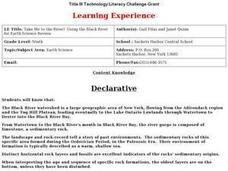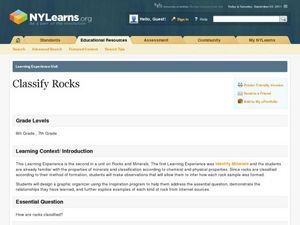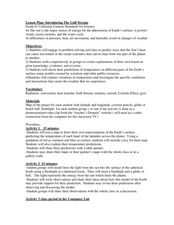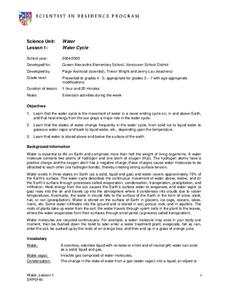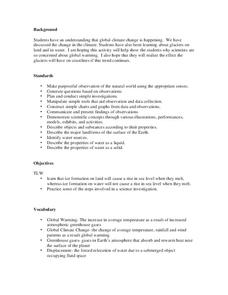Laboratory for Atmospheric and Space Physics
Orbit Simulator
Researchers think they have evidence of a new planet deep in our solar system that is the size of Neptune and orbits the sun far beyond Pluto. The orbit simulator shows the orbits of our well-known planets, as well as Pluto and the comet...
Curated OER
Take Me to the River! Using the Black River for Earth Science Review
Ninth graders use maps to identify landscape regions and drainage patterns producing the Black River. They create PowerPoint presentations pertaining to the Black River watershed, its geologic history and highlighting safe rafting...
Curated OER
On the Rise . . . Sea Level and Global Warming
Ninth graders conduct an experiment to determine how melting sea ice affect sea level. In this earth science lesson, 9th graders explain the environmental consequences of rising sea level. They relate this lesson to global warming.
Curated OER
Meteors
Learners identify the different types of meteorite using an interactive website. In this earth science lesson, students simulate how meteors crash on a surface. They relate meteor size to crater size.
Curated OER
Volcanoes
Students explore the formation of volcanoes. In this earth science lesson, students build their own volcanoes in the lab using different materials. They identify the different types of volcanoes.
Curated OER
Earthquake Science Project
Students simulate the Earth's plates moving like an earthquake by using newspaper and soil. In this earthquake lesson plan, students push and pull the newspaper together that has soil on top and observe what happens.
Curated OER
Using Newsprint as a UV Detector
Students investigate the effects of UV radiation. In this earth science lesson, students explain how the time of day relate to UV abundance on Earth. They determine if weather affects the amount of UV that Earth receives.
Curated OER
Landslides!
Students discover soil and Earth movement by experimenting in class. In this Earth Science lesson, students utilize a stream table, soil, graduated cylinder and water to create a re-enactment of a landslide. Students simulate different...
Curated OER
Classify Rocks
Students classify different types of rocks. For this earth science lesson, students test different rock samples and construct a chart to record observations. They create a concept map that answers essential questions.
Curated OER
Introducing The Gulf Stream
Sixth graders research the average temperatures of different places on Earth. In this earth science lesson, 6th graders explain how the sun's heat cause ocean movement. They discuss how temperature change affects the weather we experience.
Curated OER
Water Cycle
Young scientists explore Earth elements by conducting an experiment. They define water vocabulary terms such as condensation and precipitation. In addition, they conduct a water experiment in which they build a terrarium, so they can...
Curated OER
An Invisible Pull
Fifth graders explain why objects thrown upward falls back to Earth. In this earth science lesson plan, 5th graders identify the forces acting on objects. They discuss why planets do not float in space.
Curated OER
Global Climate Change
Second graders investigate the effect of melting glaciers to sea level. In this earth science lesson, 2nd graders simulate the process in the lab by conducting an experiment using ice cubes and clay. They explain the consequences of...
Curated OER
Mr. and Mrs. Cress Head
Students explore Earth science by completing a plant art project. In this botany lesson, students utilize tights and soil to create a furry, grassy puppet style animal from cress seeds. Students cut off the excess cress after several...
Curated OER
Outgassing
Students demonstrate the concept of outgassing and to explain the origins of the earth's atmosphere. They perform a simple experiment using glass jars, two antacid tablets, and some water. This experiment does a good job in demonstrating...
Curated OER
8th Grade Earth Science: Density
Students draw upon their prior knowledge of the density of water and practice writing a hypothesis, making an observation, and analyzing data while watching a density demonstration.
Curated OER
Magnetism
Provide physical science explorers an overview of magnetism with this collection of slides. The third slide posts hyperlinks to websites that cover magnetic fields in detail, so ideally this presentation would be viewed by small groups...
California Academy of Science
Carbon Cycle Role Play
Anytime you make concepts clear with role playing or hands-on experience, it's a win for the whole class. Ping-Pong balls are used to represent carbon in a carbon cycle role-play activity. In small groups, children first discuss what...
Curated OER
Rock My World
Students conduct a hands-on experiment designed to demonstrate how continents and oceans formed and why the manner of formation is relevant to a study of volcanoes.
Curated OER
Erosion in Different Soils
Fourth graders observe and identify the effects of weathering and geological activities. They take part in an excellent hands-on group activity called "Erosion Race," in which each group tries to simulate erosion of soil in the quickest...
Curated OER
Unit 3: Scientific Writing
Write-on! Demonstrate a writing model and support learners as they write an informational essay on a water resource issue of your (or their) choosing. The lesson plan provides a well-scaffolded summative writing experience that wraps up...
NOAA
Please Pass the Salt
Salinity is the focus of two experimenters that work to answer the question, How does salt change the physical properties of water? Super scientists compare the freezing rate of salt and fresh water, combine the two waters to observe how...
Florida International University
Design Your Own
Apply scientific principles to designing an experiment to study organisms living on the coral reef in our oceans. Through reading, individuals learn about the coral reef ecosystem and important factors that affect its function. Using the...
Curated OER
The Air We Have Around Us
Students listen to story, The Lorax, by Dr. Seuss, discuss air quality and how people affect the earth and its atmospheric cycles, and give oral reports on what they have learned.



